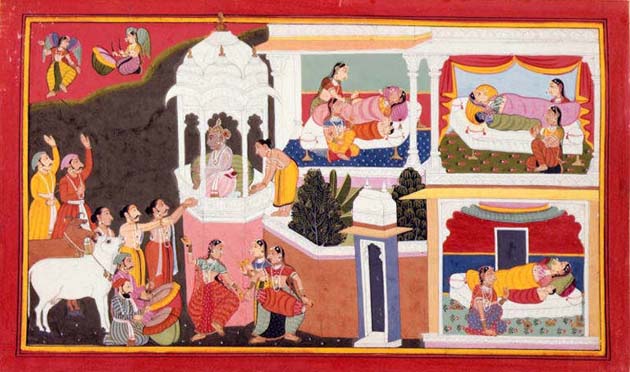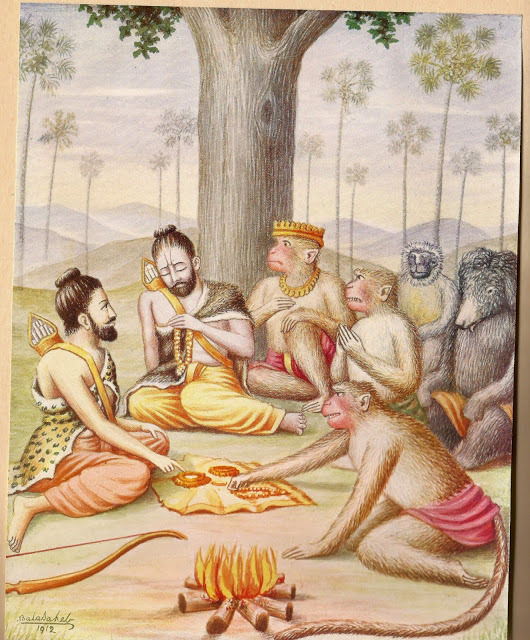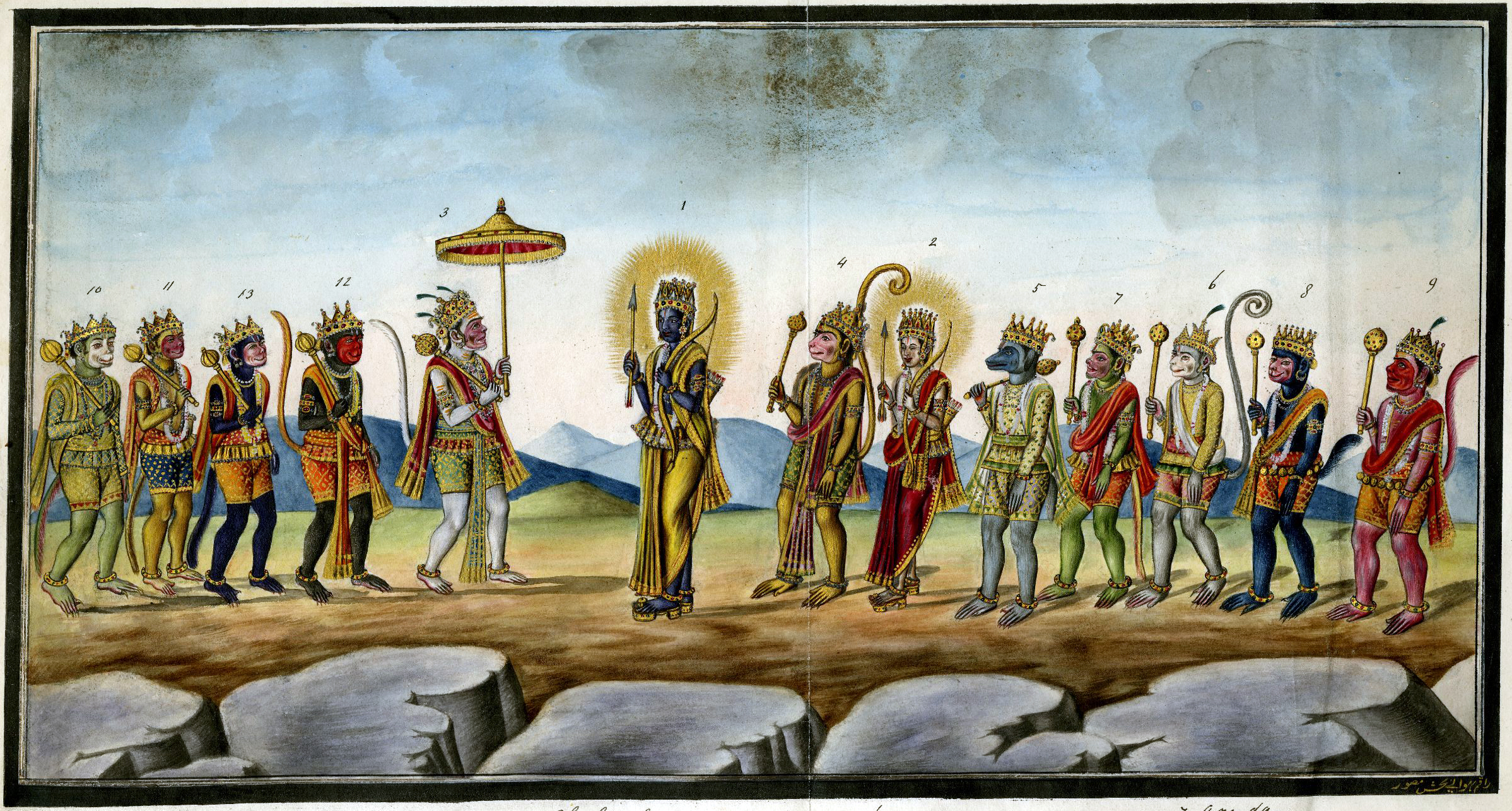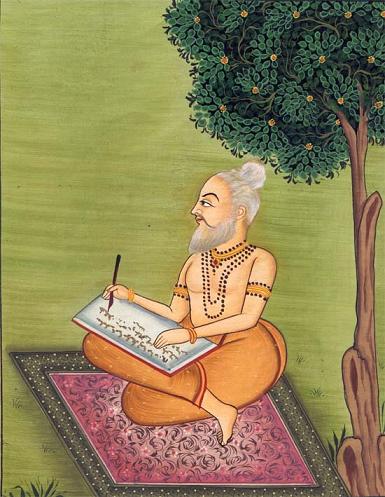|
Angada
Angada ( Sanskrit: अङ्गदः, IAST: Aṅgada) is a legendary vanara in Hinduism. He helps Rama find his wife Sita and fight her abductor, Ravana, in the epic Ramayana. He is the prince of Kishkindha, and is later crowned as the kingdom's monarch. Legend Angada is a son of the powerful vanara king Vali, and his wife Tara. He is the nephew of Sugriva. After Rama and Sugriva kill his father, Angada joins Rama's forces to rescue Sita from Ravana's captivity. Angada and Tara are instrumental in reconciling Rama and his brother, Lakshmana, with Sugriva, after the king fails to fulfill his promise to help Rama find and rescue his wife. Together, they are able to convince Sugriva to honour his pledge to Rama, instead of spending his time carousing and drinking. Sugriva then arranges for ''vanaras'' to help Rama and organises the monkey army that will battle Ravana's demonic host. Angada leads the particular search party, which consists of Hanuman and Jambavanta ... [...More Info...] [...Related Items...] OR: [Wikipedia] [Google] [Baidu] |
Tara (Ramayana)
In the Hindu epic ''Ramayana'', Tara ( sa, तारा, , literally "star";) is the Queen of Kishkindha and wife of the monkey ( vanara) King Vali. After being widowed, she becomes the Queen of Sugriva, Vali's younger brother. Tara is described as the daughter of the monkey physician Sushena in the ''Ramayana'', and in later sources, as an '' apsara'' (celestial nymph) who rises from the churning of the milky ocean. She marries Vali and bears him a son named Angada. After Vali is presumed dead in a battle with a demon, his brother Sugriva becomes king and appropriates Tara; however, Vali returns and regains Tara and exiles his brother, accusing him of treachery. When Sugriva challenges Vali to a duel, Tara wisely advises Vali not to accept because of the former's alliance with Rama—the hero of the ''Ramayana'' and an avatar of the god Vishnu—but Vali does not heed her, and dies from Rama's arrow, shot at the behest of Sugriva. The ''Ramayana'' and its later adaptati ... [...More Info...] [...Related Items...] OR: [Wikipedia] [Google] [Baidu] |
Bali (Ramayana)
Vali ( sa, वाली, nominative singular of the stem वालिन् (''Valin'')), also known as Bali, was a king of Kishkindha in the Hindu epic Ramayana. He was the husband of Tara, the biological son of Vriksharaja, the elder brother of Sugriva, and father of Angada. He was killed by Rama, an '' avatar'' of Vishnu. Vali was invincible during the'' Treta Yuga''. Vali defeated some great warriors, only because he was blessed with the ability to obtain half the strength of his opponent. Rama killed Vali by shooting him in the chest. However, during his first attempt, Rama could not recognise between Vali and Sugriva due to their resemblance. Thus, during the next attempt, Sugriva wore a garland of red flowers and went to battle with Vali. This time, Rama could recognise Vali and shot an arrow that killed him. Early life Vali was the husband of Tara. As one myth goes, fourteen types of gem or treasure were produced from the churning of the ocean during the time of ... [...More Info...] [...Related Items...] OR: [Wikipedia] [Google] [Baidu] |
Lakshmana
Lakshmana ( sa, लक्ष्मण, lit=the fortunate one, translit=Lakṣmaṇa), also spelled as Laxmana, is the younger brother of Rama and his loyalist in the Hindu epic ''Ramayana''. He bears the epithets of Saumitra () and Ramanuja (). He is the twin of Shatrughna. Legend Birth and marriage King Dasharatha of Ayodhya had three wives: Kausalya, Kaikeyi, and Sumitra. He performed a sacrifice to beget sons and as a result, his queens became pregnant. Lakshmana and his brother Shatrughna were born to Sumitra, while Rama and Bharata were born to Kausalya and Kaikeyi. In the Puranas, Lakshmana is described as an incarnation of Shesha, the multiple-headed naga (serpent) upon whom rests the preserver deity Vishnu, whose avatar Rama is considered to be. When sage Vishvamitra asked Rama to kill the demons in the forest, Lakshmana accompanied them and went to Mithila with them. Lakshmana was especially attached to Rama. When Rama married Sita, Lakshmana marr ... [...More Info...] [...Related Items...] OR: [Wikipedia] [Google] [Baidu] |
Sugriva
''This character is about the vanara, in the Ramayana.'' Sugriva ( sa, सुग्रीव, , ) is a character In the ancient Indian epic Ramayana. He is the younger brother of Vali (Ramayana), Vali, whom he succeeded as ruler of the vanara kingdom of Kishkindha. Rumā is his wife. He is a son of Surya, the Hindu deity of the sun. As the king of the vanaras, Sugriva aided Rama in his quest to liberate his wife Sita from captivity at the hands of the rakshasa king Ravana. Nomenclature He is also known as jv, Sugriwa, th, Su-khrip, lo, Sugeep, km, Sukhreeb, Creole language, Creole: ''Soogrim'', lo, Sangkip, ta, Cukkirivan, my, Thugyeik, Sugreeva or Sugreev. Legend The story of Sugriva is part of Ramayana and in an abbreviated version, is also present in the Mahabharata. The king of Kishkindha, Vrikshraja, was a divine creature born from Brahma’s tilaka. He had the body of a human and face and tail of a monkey. He was instructed to roam the forests and kill demons ... [...More Info...] [...Related Items...] OR: [Wikipedia] [Google] [Baidu] |
Narantaka
Narantaka (Sanskrit: नरान्तक, IAST: narāntaka, lit. ''destroyer of men'') and Devanataka (Sanskrit: देवान्तक, IAST: devāntaka, lit. ''destroyer of Gods'') are asuras and sons of Ravana who appear in a number of Hindu legends. They, along with Atikaya, were the offspring of Ravana and his second wife Dhanyamalini. In the battle of Ramayana, Narantaka was killed by Angada, the son of Bali, whereas Devantaka was slaughtered by the punch of Hanuman Hanuman (; sa, हनुमान, ), also called Anjaneya (), is a Hindu god and a divine '' vanara'' companion of the god Rama. Hanuman is one of the central characters of the Hindu epic ''Ramayana''. He is an ardent devotee of Rama and ... in a duel. Rakshasa in the Ramayana Asura References [...More Info...] [...Related Items...] OR: [Wikipedia] [Google] [Baidu] |
Indrajit
Meghanada (), also referred to by his epithet Indrajita , according to Hindu texts, was the crown prince of Lanka, who conquered Indraloka (Heaven). He is regarded as one of the greatest warriors in Hindu texts. He is a major character mentioned in the Indian epic ''Ramayana.'' Meghnada is the central character in Bengali ballad '' Meghnad Badh Kavya''. He played an active role in the great war between Rama and Ravana. He acquired many kinds of celestial weapons from his Guru Shukra. His most prominent feat is having defeated the devas in heaven. Using the Brahmastra, Indrajita killed 670 million vanaras in a single day; nearly exterminating the entirety of the vanara race. No warrior had ever achieved this statistical feat before in the Ramayana. Etymology Indrajita had the special ability to fight from the sky, hidden behind the clouds. That is why both Rama and Lakshmana were defeated during the battle and were tied up by the snake. In Sanskrit, the literal translatio ... [...More Info...] [...Related Items...] OR: [Wikipedia] [Google] [Baidu] |
Vanara In The Ramayana
In Hindu, Vanara ( sa, वानर, , forest-dwellers) are either monkeys, apes, or a race of forest-dwelling people. In the epic the ''Ramayana'', the Vanaras help Rama defeat Ravana. They are generally depicted as humanoid apes, or human-like beings. Etymology There are three main theories about the etymology of the word "Vanara": * Aiyanar suggests that ''vanara'' means "monkey" derived from the word ''vana'' ("forest"), Literally meaning "belonging to the forest" Monier-Williams says it is probably derived from ''vanar'' (lit. "wandering in the forest") and means "forest-animal" or monkey. * Devdutt Pattanaik suggests that it derives from the words ''vana'' ("forest"), and ''nara'' ("man"), thus meaning "forest man" and suggests that they may not be monkeys, which is the general meaning. * It may be derived from the words ''vav'' and ''nara'', meaning "is it a man?" (meaning "monkey") or "perhaps he is man". Identification Although the word Vanara has come to me ... [...More Info...] [...Related Items...] OR: [Wikipedia] [Google] [Baidu] |
Ramayana
The ''Rāmāyana'' (; sa, रामायणम्, ) is a Sanskrit epic composed over a period of nearly a millennium, with scholars' estimates for the earliest stage of the text ranging from the 8th to 4th centuries BCE, and later stages extending up to the 3rd century CE. ''Ramayana'' is one of the two important epics of Hinduism, the other being the ''Mahābhārata''. The epic, traditionally ascribed to the Maharishi Valmiki, narrates the life of Sita, the Princess of Janakpur, and Rama, a legendary prince of Ayodhya city in the kingdom of Kosala. The epic follows his fourteen-year exile to the forest urged by his father King Dasharatha, on the request of Rama's stepmother Kaikeyi; his travels across forests in the Indian subcontinent with his wife Sita and brother Lakshmana, the kidnapping of Sita by Ravana – the king of Lanka, that resulted in war; and Rama's eventual return to Ayodhya to be crowned king amidst jubilation and celebration. The ''Ramayana'' is ... [...More Info...] [...Related Items...] OR: [Wikipedia] [Google] [Baidu] |
Vanara
In Hindu, Vanara ( sa, वानर, , forest-dwellers) are either monkeys, apes, or a race of forest-dwelling people. In the epic the ''Ramayana'', the Vanaras help Rama defeat Ravana. They are generally depicted as humanoid apes, or human-like beings. Etymology There are three main theories about the etymology of the word "Vanara": * Aiyanar suggests that ''vanara'' means "monkey" derived from the word ''vana'' ("forest"), Literally meaning "belonging to the forest" Monier-Williams says it is probably derived from ''vanar'' (lit. "wandering in the forest") and means "forest-animal" or monkey. * Devdutt Pattanaik suggests that it derives from the words ''vana'' ("forest"), and ''nara'' ("man"), thus meaning "forest man" and suggests that they may not be monkeys, which is the general meaning. * It may be derived from the words ''vav'' and ''nara'', meaning "is it a man?" (meaning "monkey") or "perhaps he is man". Identification Although the word Vanara has come to me ... [...More Info...] [...Related Items...] OR: [Wikipedia] [Google] [Baidu] |

.jpg)






